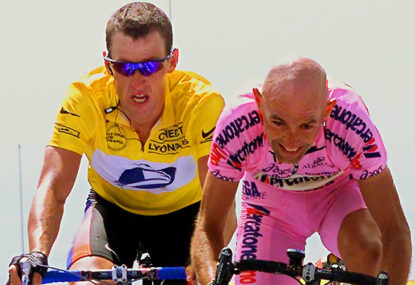'I've just won a stage of the Tour de France, mate!': Hindley grabs yellow jersey as Aussie blows Tour apart
Australia's Jai Hindley has said he is "lost for words" after a shock stage victory at the Tour de France earned him the leader's…

A friend today said, “what’s with people still writing stuff about Lance Armstrong, does anybody even care about him anymore?”
At the time I wholeheartedly agreed.
In 2010 I waded my way through the whole USADA report and the various testimonies as it just got worse and worse and the ‘watching the tour at 1am’ cycling fan in me died (for a time).
Now my feelings on cycling have become more positive and I again watch races and enjoy the season. But that’s not what this opinion piece is about.
Basically, in thinking about the current situation in cycling and engaging in some breif debates on comment sections/forums, given what’s happened in the past, Lance Armstrong (LA) is important.
LA is not important as an individual or for what drugs he took or for what races he won, LA is important to the sport of cycling for the omerta he represents.
This omerta was so strong, unified and impenetrable, that it allowed an enormous and stunningly bold fraud to be committed, the biggest lie sport has ever seen.
In the face of supplements in AFL, steroids in Major League Baseball and match-fixing in cricket, cycling’s omerta was the biggest.
To define omerta (and I’m open to correction) it is essentially a gentlemen’s agreement between all professional cyclists to present to the public the image of a drug-free sport.
This doesn’t just mean to not talk about doping, but to act in such a way so as to present yourself and your peers as clean athletes.
A great example of this is in the testimony of one of the USADA athletes, where they said when an athlete tested positive, the routine was to publicly condemn them.
Omerta is a cultural tool, it’s not specifically spelled out or enforced by a particular group, it’s something which is ingrained in individuals as they enter the profession eager to perform, and it moulds that individual’s attitudes and way of thinking.
Omerta has appeared many times in various parts of society, examples include Enronn, at financial institutions with sub-prime lending in the global financial crisis and with sex abuse in the Catholic Church.
Usually a fraud of the scope and size of LA would be fully and independently investigated, so the public can understand what happened, and steps can be taken to stop it from it happening again (whether that has happened in the examples I just quoted is moot, in that it hasn’t happened, fully, but ideally it would).
This has not happened in the LA case to any extent.
The symptoms of the disease have been punished, but the disease itself may still exist, it may not, but as cycling fans and journalists, all on the outside looking in, it’s impossible to know.
This is obviously the result of poor governance on the part of the UCI, and certainly Brian Cookson’s recent actions have given fans (or at least me) hope.
It’s important to remember this point when being a cycling fan in the present.
Cyclists in the present are quick to talk about a change in culture and point to the different style of racing and training, which is fine, these arguments may very well be true.
However without full disclosure and a proper investigation into the culture which allowed LA’s situation to exist, cycling fans can’t know if what they are seeing is real or not.
I’m not saying cyclists should be bombarded with doping questions at every opportunity, culture is something which filters down from the top and it is the UCI which has the greatest ability to destroy omerta (should it still exist) and I totally understand it’s difficult for fans to interact with an organisation which they have no voice in.
Essentially, without a full and proper investigation into cycling at least during the LA era, it’s impossible to know if ‘marginal gains’ are the result of training at altitude or just a different, improved pedalling efficiency.
It’s impossible to know if Stuey O’Grady really did kick the habbitt in 1998 or if the ‘totally different culture’ really is a different culture and it would be naive of fans should to be too eager to buy into the ‘new cycling’.
History shows if a culture of secrecy and fraud is not exposed to the public, then it continues to exist.
At the end of the day, cycling is a sport, it’s hard, it’s people’s livelihoods and it’s big, but it’s not trying to end poverty.
Fans who fuel the sport should know what they’re watching is real.